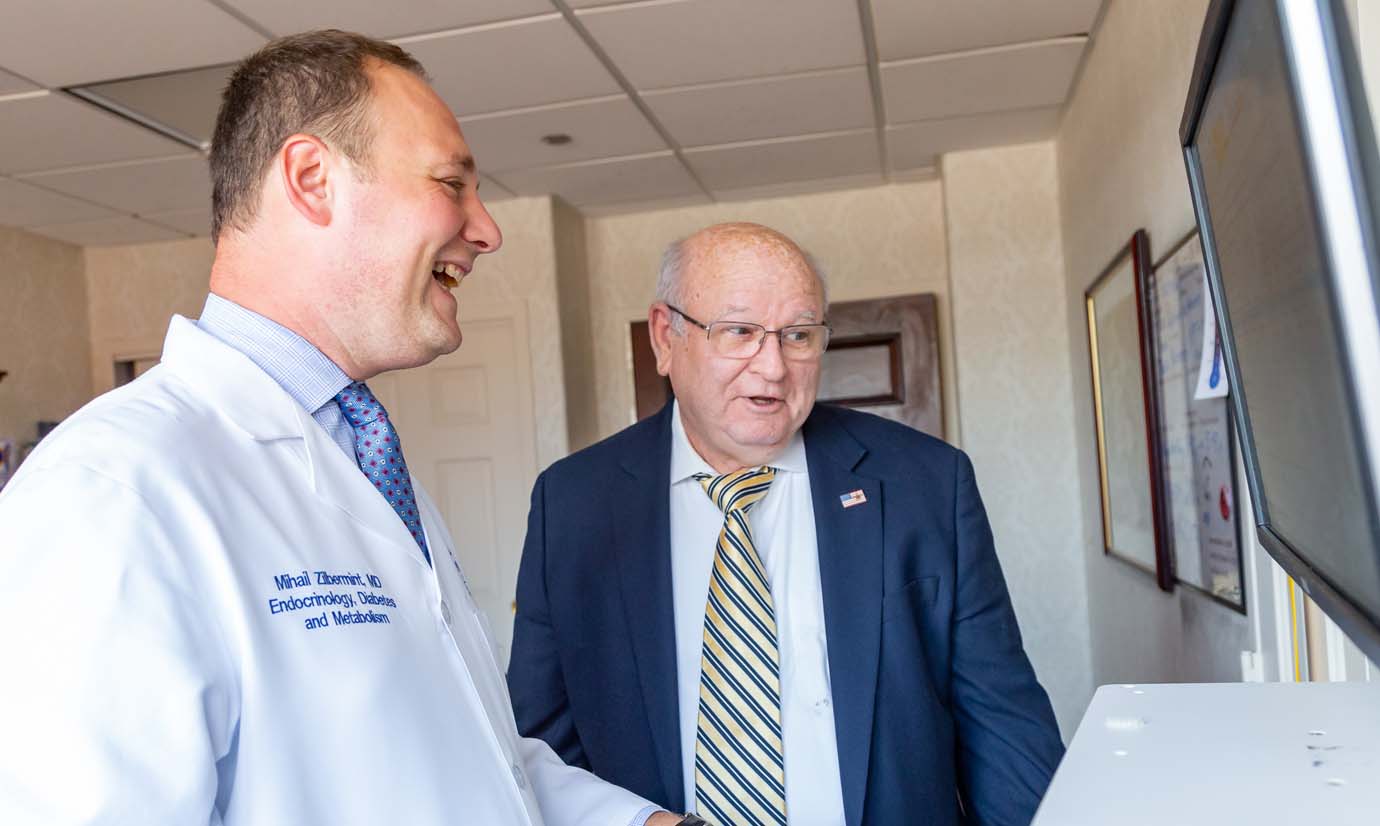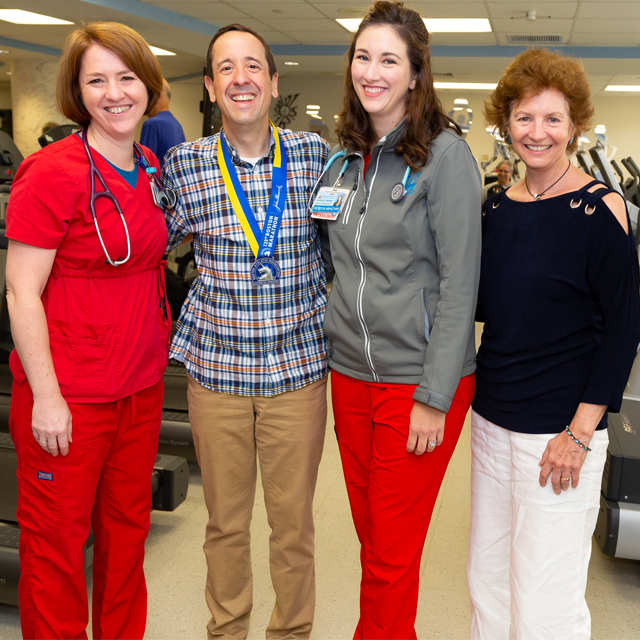Ralph Roarty spent most of his 65 years in the carpet business, supplying many of Washington, D.C.’s top hotels, offices and homes with fine rugs from around the world. But after he retired a few years ago, a series of health problems left him wondering if he’d ever feel good again.
In January 2018, Roarty underwent back surgery. Then, kidney troubles, a bout with sepsis and a heart attack led to a lengthy hospital stay. During his weekslong recovery process in the hospital, Roarty, who also has type 2 diabetes, met with endocrinologist Mihail Zilbermint, M.D., chief of endocrinology, diabetes and metabolism at Suburban Hospital and director of the hospital’s Inpatient Diabetes Management Service.
“Even though I was there for back surgery, Dr. Zilbermint asked me questions about my diabetes,” Roarty says from his home in Silver Spring, adding that his recovery is going well. “He actually listened to me. I’ve been to more than a few endocrinologists, but Dr. Zilbermint is the best.”
Following his stay at Suburban, Roarty now has a realistic, customized plan to keep his diabetes under control. He says he’s encouraged by his progress and hopes better management of the disease will lead to overall better health.
In a little more than three years, Zilbermint and his team have transformed inpatient diabetes care at Suburban Hospital, making sure patients such as Roarty get the specialized attention the disease requires. Zilbermint makes bedside visits to patients with diabetes after admission, regardless of what prompted the hospitalization. He also develops a personalized care plan, arranges a follow-up with a certified diabetes educator and offers to connect the patient with Johns Hopkins specialists post-discharge for continued care. In addition, the team helped create an extensive series of free or low-cost wellness programs for community members to help them improve their health.
When patients who have diabetes are admitted to hospitals for other conditions, their day-to-day diabetes care can sometimes take a secondary role. Zilbermint says that poor management of the chronic condition during a hospital stay can lead to complications and a longer recovery time.
“Our team works hard to let patients know that, even after they’re out of the hospital, we’ll help them get their diabetes under control and live a great life,” Zilbermint says.
The tailored plans that patients receive when they leave the hospital include a range of ways to live well with diabetes, such as by improving nutrition, getting more exercise and strengthening engagement in their care. The results have led to shorter hospital stays and reduced readmissions.
Type 2 Diabetes: A Growing Threat
According to the Centers for Disease Control and Prevention (CDC), fewer than 2 million Americans had diabetes in 1960. Today, more than 30 million do. Of those, 90% to 95% have the type 2 variety. An aging population and the obesity epidemic are among the reasons type 2 diabetes has skyrocketed in the United States.
In type 2 diabetes, a person’s body gradually becomes unable to use insulin, a hormone that turns blood sugar into energy. To compensate, they produce even more insulin their bodies can’t absorb, leading to high levels of glucose in the blood. Ultimately, they’re unable to produce enough insulin to maintain normal blood glucose levels. People with uncontrolled type 2 diabetes are at increased risk of heart disease, blindness, stroke and other dangerous conditions. The disease is the seventh leading cause of death in the United States.
2017 Innovations in Clinical Care Award - Mihail Zilbermint, M.D.
Mihail Zilbermint, M.D. is the 2017 recipient of the Innovations in Clinical Care Award at Suburban Hospital. Dr. Zilbermint and his team introduced hospitalwide glycemic guidelines and protocols, leading to lower lengths of stays for patients with diabetes, reducing readmissions for these patients by 15.5 percent and saving about $143,000 per month.

Reducing Length of Stay and Readmissions at Suburban Hospital
In the April 2019 edition of the Journal of Community Hospital Internal Medicine Perspectives, Zilbermint and colleagues at Suburban and Johns Hopkins published study results showing that their patients with diabetes had significant reductions in both length of stay in the hospital and readmission to the hospital within 30 days of discharge.
They studied data on more than 4,600 patients with diabetes who were admitted to Suburban Hospital over 17 months in 2016 and 2017. Patients who worked with Zilbermint’s Inpatient Diabetes Management Service averaged 27% shorter hospital stays than patients who didn’t. In addition to improved health outcomes, Zilbermint calculated a potential savings of nearly $1 million for the hospital.
“It’s important to consider diabetes at every stage of care,” Zilbermint says. “It affects so many of the body’s systems.”
When he learns of a new Suburban Hospital inpatient who has diabetes, Zilbermint pays a visit to determine how well he or she is living with the disease. “I ask them to tell me their diabetes story,” he says. “When were they diagnosed? What sort of medicine do they take?”
Zilbermint works with Cynthia Tucker, R.N., who has lived with type 1 diabetes since 1978, to follow up with patients during their hospital stays. They collaborate to educate patients and develop the personalized plans to help them effectively manage their diabetes.
After patients receive their diabetes action plans and are discharged from Suburban, they’re encouraged to continue care with Regina Kundell, C.R.N.P., a Johns Hopkins Community Physicians endocrinology nurse practitioner. Before their hospitalization, Kundell reviews the medications patients are taking. She often tries to get patients off insulin therapy, and prescribes one of the newer medications designed to help the body make its own insulin.
Many of the newer medicines are making it easier than ever to live well with diabetes, she says.
“I’m the bridge between inpatient hospital care to living your everyday life with diabetes,” Kundell explains. “Sometimes it’s easy to lose momentum after you’re released from the hospital. If you’re working with someone like me, that’s less likely to happen.”
Like Tucker, Kundell lives with type 1 diabetes. “I think it helps patients relate to me,” she says, adding that part of educating patients is helping them “understand the pathology” of diabetes.
“It’s more than just, ‘My pancreas has trouble making insulin,’” Kundell explains. She uses a graphic to illustrate to patients the systems that are disrupted by diabetes. Kidneys, muscles, the liver, the brain and the gastrointestinal tract are all affected.
“Most patients really benefit from detailed explanations of just what happens when we have diabetes,” says Kundell. “That way, their treatment makes more sense to them.”
Zilbermint, Tucker and the inpatient team emphasize a realistic approach to managing the disease. Pressuring patients with expectations of perfect compliance, they say, frequently leads to frustration.
“Keeping people engaged and focused on their own health is the key,” says Zilbermint.
In addition to inpatient and outpatient diabetes care, Suburban Hospital offers various wellness programs designed to help patients live healthier lives. Healthy Choices, a 10-week class taught by a registered dietitian, explores “nondiet lifestyle” approaches to weight management, and touches on nutrition, exercise and behavior change.
“Look, we’re all human,” Zilbermint says. “More than a quarter of all patients admitted to Suburban Hospital have diabetes. It’s foolish to think that the same approach will work for everyone.”
The CDC estimates that 8 million Americans have diabetes but don’t know it. Zilbermint says he sees more than a few patients who didn’t know they had the disease until their hospitalization at Suburban. What does he say?
“I tell them it’s not the end of life,” he says. “I let them know that, actually, it can be the beginning of a much better, much healthier life.”
Ralph Roarty can attest to that. He’s on new medicines and is eating better, thanks to working with a dietitian who specializes in diabetes.
“I feel better now than I have in years,” he says.



